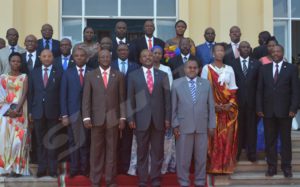 The Council of Ministers met this Thursday in Gitega in central Burundi to consider Burundi’s membership of the International Criminal Court. Burundi ratified the Rome Statute, giving the war crimes court jurisdiction over the country, in 2004.
The Council of Ministers met this Thursday in Gitega in central Burundi to consider Burundi’s membership of the International Criminal Court. Burundi ratified the Rome Statute, giving the war crimes court jurisdiction over the country, in 2004.
The current crisis began when President Nkurunziza officially announced his candidacy for a third term in 2015. Nigarura Lambert, one of the lawyers of families of the victims of the crisis who lodged a complaint with the ICC, says that Burundi withdrawing from Rome Statute will not change much.
According to him, any state that has ratified the Rome Statute has the right to withdraw from the Statute of the ICC, but that withdrawal does not impact outstanding legal proceedings. “The withdrawal of Burundi from ICC does not prevent the International Criminal Court from continuing to investigate this country,” said Nigarura.
Since April 2016, the ICC has begun preliminary examinations into crimes committed in Burundi since April 2015. The country’s withdrawal will not affect that. “To permanently withdraw from the ICC requires at least a year. Any country that wants to withdraw has to write a letter to the UN Secretary General. The withdrawal shall take effect one year after the date on which the notification was received,” he says.
Even countries that have not ratified the statute can be prosecuted by the ICC if they have committed serious violations of human rights or crimes against humanity. Article 13 of the ICC Statute said that the United Nations Security Council has the right to ask the International Court to work in a country that has not ratified the Statute.



















 IWACU Open Data
IWACU Open Data

